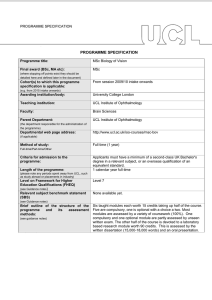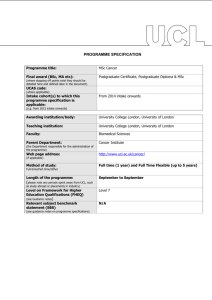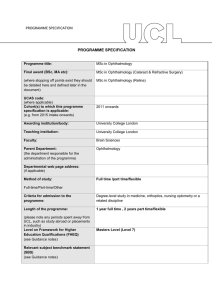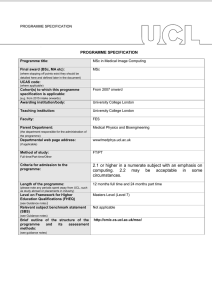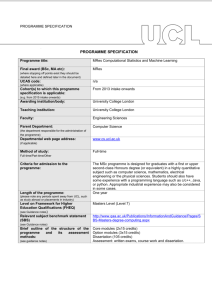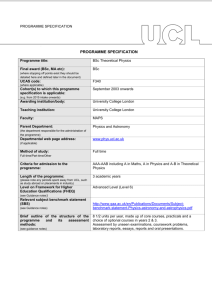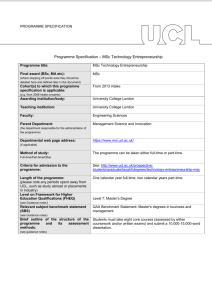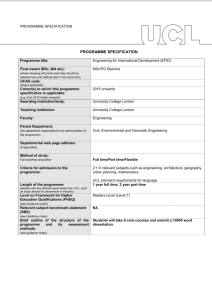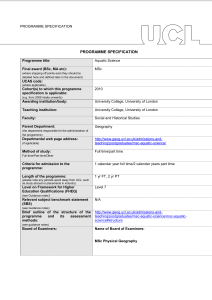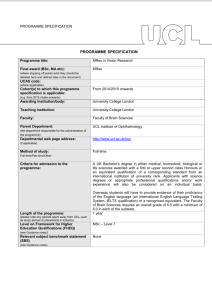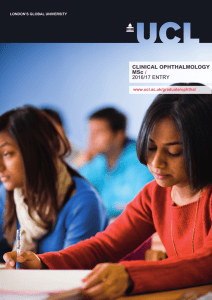MSc Clinical Ophthalmology - University College London
advertisement
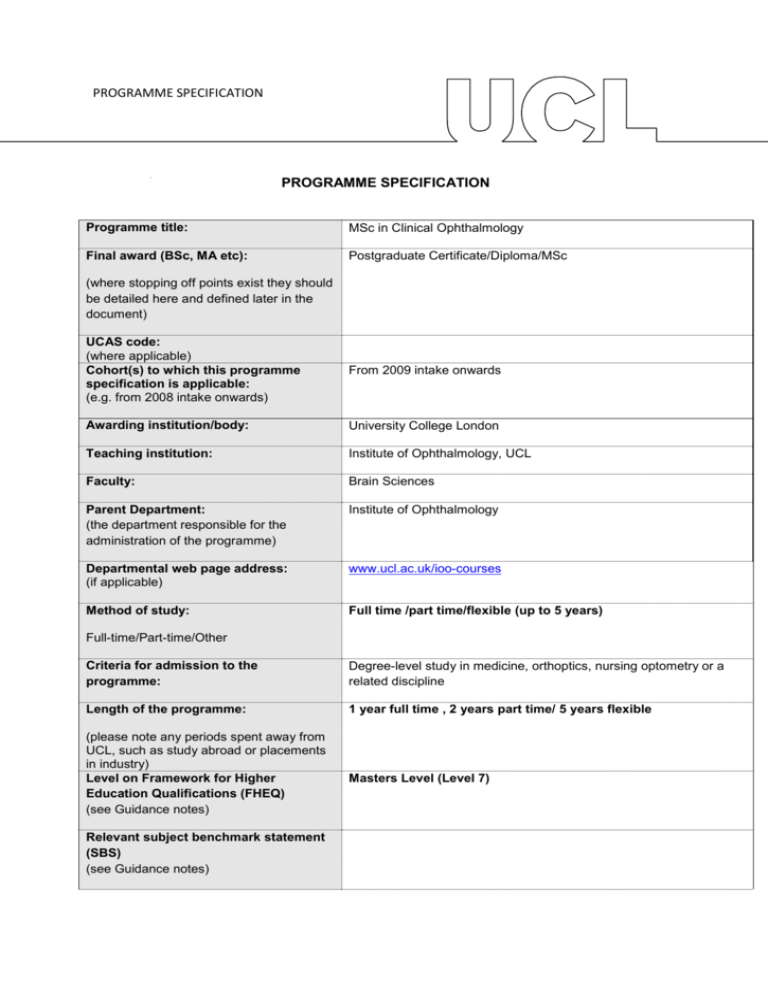
PROGRAMME SPECIFICATION PROGRAMME SPECIFICATION Programme title: MSc in Clinical Ophthalmology Final award (BSc, MA etc): Postgraduate Certificate/Diploma/MSc (where stopping off points exist they should be detailed here and defined later in the document) UCAS code: (where applicable) Cohort(s) to which this programme specification is applicable: (e.g. from 2008 intake onwards) From 2009 intake onwards Awarding institution/body: University College London Teaching institution: Institute of Ophthalmology, UCL Faculty: Brain Sciences Parent Department: (the department responsible for the administration of the programme) Institute of Ophthalmology Departmental web page address: (if applicable) www.ucl.ac.uk/ioo-courses Method of study: Full time /part time/flexible (up to 5 years) Full-time/Part-time/Other Criteria for admission to the programme: Degree-level study in medicine, orthoptics, nursing optometry or a related discipline Length of the programme: 1 year full time , 2 years part time/ 5 years flexible (please note any periods spent away from UCL, such as study abroad or placements in industry) Level on Framework for Higher Education Qualifications (FHEQ) (see Guidance notes) Masters Level (Level 7) Relevant subject benchmark statement (SBS) (see Guidance notes) Brief outline of the structure of the programme and its assessment methods: (see guidance notes) This course has six required core modules (15 credits each totaling 90 credits). These will each be assessed by an unseen written exam (60%) and coursework (40%). There will be four optional modules offered and students will take two of these for a total of 30 credits. Each optional module will be assessed by an unseen written exam (60%) and coursework (40%). The final part of the course comprises a library/clinical based project worth 60 credits. A 10,000-12,000 dissertation will be required as the research project Board of Examiners: Name of Board of Examiners: Board of Examiners for Clinical Ophthalmology Professional body accreditation (if applicable): N/A Date of next scheduled accreditation visit: EDUCATIONAL AIMS OF THE PROGRAMME: The programme will provide trainee ophthalmologists with an in depth knowledge of the theory behind the practice of Ophthalmology, and will be taught by experienced teachers with dedicated time given for this structured teaching. Students will also be able to assess their understanding using the problem based learning questions in each module. This is all complemented by the practical skills which they are required to achieve in their base hospitals. The dissertation offers the opportunity for in depth learning on a topic, learning the skills required to obtain, assimilate, assess and write the information obtained into a useful and readable mini thesis. PROGRAMME OUTCOMES: The programme provides opportunities for students to develop and demonstrate knowledge and understanding, qualities, skills and other attributes in the following areas: A: Knowledge and understanding Knowledge and understanding of: Teaching/learning methods and strategies: Basic Clinical Ophthalmology Lectures, seminars, problem based learning, clinical application Ocular Therapeutics Ocular surgery and related topics Basic ophthalmic science Optics and refraction Assessment: Unseen MCQ exams, written dissertation and fulfillment of clinical experience requirement B: Skills and other attributes Intellectual (thinking) skills: Teaching/learning methods and strategies: In depth knowledge of the clinical theory and trials underpinning ophthalmic practice in key areas Lectures, group discussions, critical reading of journal articles, literature reviews Key clinical skills as designated by the curriculum of the Royal College of Ophthalmologists for ST1 and ST2 level registrars Assessment: By Educational Supervisors in base hospitals and competencies achieved in post. Unseen exams and dissertation C: Skills and other attributes Practical skills (able to): Teaching/learning methods and strategies: Use powerpoint and other computer programmes such as reference manager Lectures, assigned reading and self-learning Conduct library searches Dissertation Write scientific dissertation Assessment: Observation, case-based assessments D: Skills and other attributes Transferable skills (able to): Teaching/learning methods and strategies: Basic statistical competencies Proficiency in various computer software Discussion and oral presentation skills Lectures, assignments, preparation of dissertation, group discussion Assessment: Assignments, dissertation, unseen written exams. The following reference points were used in designing the programme: the Framework for Higher Education Qualifications: (http://www.qaa.ac.uk/en/Publications/Documents/Framework-Higher-Education-Qualifications-08.pdf); the relevant Subject Benchmark Statements: (http://www.qaa.ac.uk/assuring-standards-and-quality/the-quality-code/subject-benchmark-statements); the programme specifications for UCL degree programmes in relevant subjects (where applicable); UCL teaching and learning policies; staff research. Please note: This specification provides a concise summary of the main features of the programme and the learning outcomes that a typical student might reasonably be expected to achieve and demonstrate if he/she takes full advantage of the learning opportunities that are provided. More detailed information on the learning outcomes, content and teaching, learning and assessment methods of each course unit/module can be found in the departmental course handbook. The accuracy of the information contained in this document is reviewed annually by UCL and may be checked by the Quality Assurance Agency. Programme Organiser(s) Name(s): Prof Sue Lightman Date of Production: 27th November 2008 Date of Review: October 2014 Date approved by Head of Department: October 2014 Date approved by Chair of Departmental Teaching Committee: October 2014 Date approved by Faculty Teaching Committee November 2014
